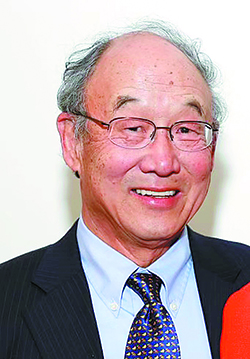Domestic tech innovation offers lessons


Former business adviser says China is now leading the way on some fronts
While the United States focuses on accusing China of things like intellectual property theft and of being a security threat, China's technological development presents valuable lessons, and failing to see this may cost the US dearly, said George Koo, a retired international business adviser in Silicon Valley.
In recent years, China has invested heavily in developing proprietary technology and has surpassed the US in certain areas, Koo said. This is especially evident in wireless communications, mobile payments and certain applications of artificial intelligence.
This year, China will step up efforts to promote innovation-driven development with a focus on promoting scientific and technological innovation, as well as industrial upgrading, according to the 2022 Government Work Report.
China will offer stronger incentives to promote innovation between businesses, academia and researchers, while strengthening the protection of intellectual property rights, Premier Li Keqiang said while delivering the report at last week's opening of the fifth session of the 13th National People's Congress, the country's top legislature.
Regarding the accusation that it is stealing intellectual property, Koo said that when China started to open up to the world, foreign companies seeking to enter its market were required to enter into a joint venture, and the investment of technology and proprietary technology was encouraged as part of the equity investment.
"So, in that sense, China was able to bring in technology, but that was at a time when China was very underdeveloped, very poor, and they needed to figure out how to invest and bring in Western technology," he said. "The leaders in Washington seem to believe that China lags behind in every aspect of technology and only knows how to copy. Presuming that we have nothing to learn from China will cost the US dearly."
The work report also stated that China will make more efforts to encourage the development of the digital economy. The nation's digital innovation is one area that the US should take lessons from, according to a study published last year by the Ivey Business Journal, a publication of the Ivey Business School.
For years, Chinese digital companies were dismissed as copycats, and they have long been accused by the US of stealing intellectual property, but in fact it is the US that should now learn from Chinese firms in adopting digital innovation that generates sustainable profit streams, the study said.
One fundamental lesson that US executives can learn from Chinese digital innovators is to take the user-driven innovation approach instead of the mission-driven approach that most Silicon Valley ventures adopt, the study said.
As an example of digital innovation, China's mobile payments business was more than 11 times the value of the United States'. Today, mobile payments make up almost 60 percent of all noncash retail transactions in China, overshadowing debit and credit cards, according to the study.
The US government has targeted Chinese tech companies and imposed export controls in recent years. Severing access to US technology in certain areas such as semiconductors will impede the pace of technological advances for China in the near term, but companies like Huawei are recruiting talent from around the world and paying excellent salaries to fill the technical gap, Koo said.
"Denying access will simply provide extra incentive to work harder and seek other innovations that will work around US-owned technology," he said. "Chinese scientists and engineers enjoy a reputation as the world's best trained and most motivated," he added. "In the 1960s, China developed the atomic bomb, and shortly thereafter the hydrogen bomb, completely on their own with no outside input, and they accomplished their goals faster than the US and the Soviet Union."
- From ice to airwaves: Beijing Sport University shines at 2026 Winter Olympics
- 1 injured in Hong Kong truck fire
- A cultural welcome at Shanghai Pudong airport
- China's trade unions boost rights and skills for new employment forms
- China to intensify oversight of school services to curb misconduct and protect students' rights
- Once-poor village in Hebei thrives on homestay-driven rural tourism




































